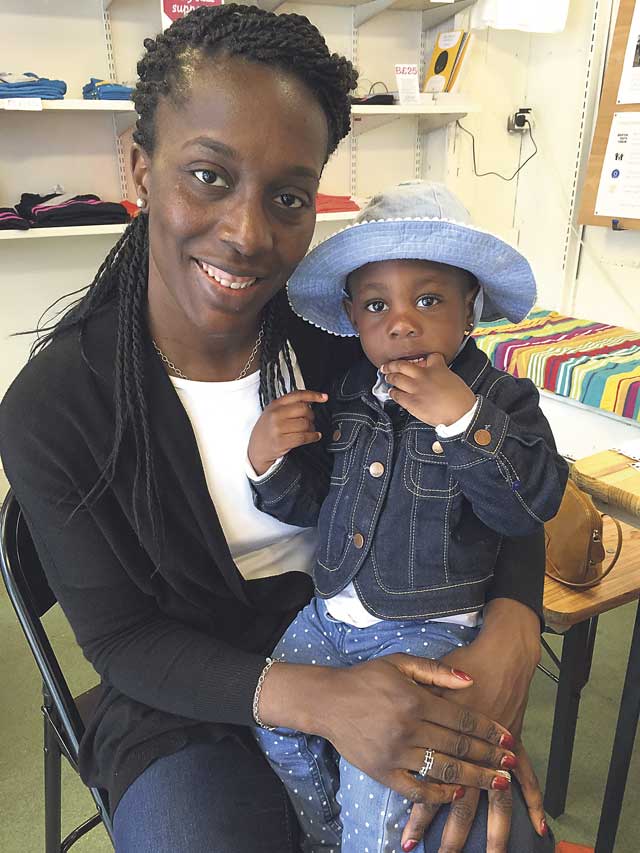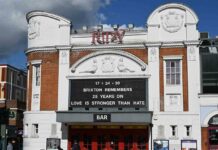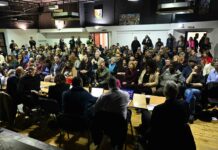 Florence Eshalomi grew up in the “barrier block” on Brixton’s Somerleyton estate. Today she represents the boroughs of Lambeth and Southwark on the Greater London Assembly. On the day after the biggest political upheaval in Britain for years, she spoke to Bugle reporter David Child and editor Linda Quinn
Florence Eshalomi grew up in the “barrier block” on Brixton’s Somerleyton estate. Today she represents the boroughs of Lambeth and Southwark on the Greater London Assembly. On the day after the biggest political upheaval in Britain for years, she spoke to Bugle reporter David Child and editor Linda Quinn
Florence Eshalomi meets us in the Brixton Pound Shop on Atlantic Road looking very together for someone who has been up half the night watching referendum results come in. Despite the Brexit shock, she is upbeat that Londoners overwhelmingly rejected what she calls the Tories’ “nasty” campaign.
On the London Assembly, she has taken over from Val Shawcross, who stepped down in May after 16 years as Labour member for Lambeth and Southwark.
Eshalomi is an all too rare example of a local girl from a BME (black and minority ethnic) community who has made it in politics. And, as the new Assembly spokesperson for transport, she has a big remit.
“Transport links so many things.” She says. “Regeneration, housing, schools – all are affected by transport, and it affects how people feel about an area.
“From the top of Brixton Hill to the Tube station is one of the worst in London for pollution and air quality.” Congestion is another big problem for commuters. Buses disgorge people at the Tube which is regularly over-crowded.
She wants the infrastructure improved and an increase in capacity. She is also keen on encouraging cycling and walking as alternatives and is hoping to see the appointment of a “walking tsar”.
Outside her immediate responsibility of transport, she says that: “A key thing is making sure investment comes into Lambeth and Southwark”.
On housing, a hot topic in Brixton, Eshalomi believes that “The mayor needs to work with London councils to get the right type of housing mix. I would like to see regulation of the private sector, with longer tenancies and security and a reduction in the fees private landlords charge.”
She is an enthusiast for mayor Sadiq Khan’s plan for a London-wide not-for-profit letting agency. “Being an Assembly member gives me the opportunity to work with the mayor, to influence and make sure developers build housing that suits local people,” she says.
But, like so many Brixton residents, she is also concerned about the pace of change. “Residents and businesses are worried about rents going through the roof, our schools are over-subscribed and there’s not enough mixed housing,” she says.
Eshalomi was brought up on the Somerleyton estate in where her family still live. She says: “Living in Southwyck House, my mum would contact the council about leaks, and get a letter back about something different. A simple problem but the council seemed unable to help us.”
Frustration with the way the council treated its tenants, a growing belief that you need to be in power to change things, and that you need role models who reflect their community – people who look and sound like you – were all factors that influenced her.
She was one of a group of young Labour activists who went to the key swing state of Ohio in the US and worked on the 2008 Obama campaign, where she met Michelle Obama. It was this, plus a spell at Utrecht university in the Netherlands studying politics, gender and ethnicity where she became active in student politics, that cemented her belief that young people need to be active in politics if they want change.
It’s for this reason that she championed the Lambeth Youth Mayor scheme when she was first elected as a councillor. She sees the scheme’s success in the range of backgrounds the youth mayors come from, including a former gang member and another from a youth referral unit.
Role models are important in encouraging others to be active. She cites Black Labour MP Diane Abbott – elected in 1987 for Hackney North and Stoke Newington and currently Labour’s shadow health secretary – as someone who led the way. “She speaks her mind and you have to respect her for that,” she says.
She also thinks that politicians have to be more honest and admit when they make mistakes and apologise.
Eshalomi is clear that her home town has changed for the better. People are no longer scared to come to the area. “When I went to school in Streatham, friends wouldn’t come to see me in Brixton, I would have to go to them.”
But, like her local MP colleague Chuka Umunna, who told the Bugle that some local youth are living in a “parallel universe”, she is worried by youth disengagement and violence among young people.
She says many young people see change as something that goes on without them having a part in. They are not consulted, or lack skills and money. She is also concerned about the breakdown of family units and mental health issues in the BME community.
For Eshalomi, her faith “is really important”. She says: “In the church halls on Sundays at any given time there will be 500 young people. Why can’t we, as the council or the police, reach those young people?”
Although she understands what draws young people towards gang culture, she also thinks society needs to be a lot tougher on perpetrators of violent crime. “We need to show them we will not tolerate violence on our streets. It affects the whole community.”
For youngsters interested in being a future Florence Eshalomi, she recommends shadowing a local councillor or chief executive for a couple of weeks. But she stresses that interns who work for longer should be paid.
Eshalomi says people should feel confident they are being listened to, and elected representatives should reflect the make-up of the local community while at the same time representing everyone.
When she first stood as a Lambeth councillor for Brixton Hill 10 years ago, there were only three non-white councillors out of 63, despite a 45 per cent BME electorate. “If somewhere like Lambeth isn’t diverse, what does it say about the rest of the country,” she says. “That 2006 election took the number of BME councillors to 12 and I’m proud to have been one of those.”







[…] and Southwark’s London Assembly Member, Florence Eshalomi, added: “With bus emissions risking serious health problems for local people, this announcement […]